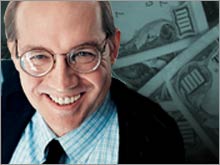|
The best retirement plan...is simple It's easier than ever to get into 'sophisticated' investment vehicles. There's a better way to secure your retirement.
NEW YORK (Money Magazine) -- With the market struggling to eke out even meager gains this year, you may be tempted to look beyond traditional investments for something, anything, to fatten up your retirement account. Financial services firms, of course, are only too eager to oblige with a growing smorgasbord of "alternative" investments - oil-well partnerships, direct investments in privately held companies, foreign currency ETFs - that seem to offer an inside track to superior gains.
There are even hedge funds targeted to retirement investors, as well as mutual funds, slated to launch later this year, that will use hedge fund strategies to help retirees generate income. But just because it's easier to get into more "sophisticated" investments, does that mean you should? I say no. While exotic investments may seem like an ideal way to revive a flagging retirement account, they often come with risks and onerous fees that could derail your retirement rather than enhance it. Superstars or Superhype? Let's start with hedge funds. There's no doubt that they have a certain cachet. After all, these portfolios are run by the smartest guys in the room - investing superstars who can reliably churn out market-beating returns regardless of whether stock prices are rising or falling. Or can they? In fact, the question of whether hedge fund managers can generate superior performance after adjusting for risk and other factors is a matter of considerable debate. For example, one recent study concluded that hedge funds actually lag the market slightly when you account for "survivorship bias" - a fancy term meaning that hedge fund databases don't always include the returns of funds that have gone out of business or just stopped reporting their results. Meanwhile, another recent study found that some hedge fund managers do offer truly superior performance, but that it's very difficult to identify those managers in advance, and their performance edge lasts only about three years. You can read dueling studies ad nauseam, but to me the bottom line is obvious: Better performance is far from a given, and even if you manage to find it, it may not last very long. What is certain is that you will pay unusually high fees for the privilege of becoming a hedge fund owner. Most hedge funds charge management fees of 1 percent to 2 percent of assets, plus 20 percent or more of any profits. If you're investing in a "fund of funds" - a fund that spreads its assets among many hedge funds and is the most common way non-millionaires get into them - you'll also pay a fee to the main fund. This fee-for-all really adds up, pushing down returns. "After all those expenses, there's no way this is likely to be a good deal for individuals," says Princeton finance professor Burton Malkiel. "My advice is to stay away." Complexity Can Backfire In other cases, investments may be clearly capable of generating attractive gains, but actually locking them in requires feats of extraordinary timing. Take new ETFs that, in effect, let you buy and sell foreign currencies, giving you a chance to profit from their ups and downs in the world market. Today, with 20/20 hindsight, it's easy to see that betting against the euro would have been a smart move early last year, since the U.S. dollar rose more than 14 percent vs. the euro in 2005. In reality, though, you probably would have done just the opposite - that is, shunned the dollar and bought euros - since the consensus back then was that the burgeoning U.S. trade and budget deficits would drive the dollar south. Similarly, it's no surprise that many 401(k) investors have loaded up on emerging markets funds, given their annualized gains of roughly 30 percent over the past three years. Indeed, by the end of last year, nearly a quarter of 401(k) participants who own such funds had between 20 percent and 49 percent of their balances in them. But while maintaining a modest position in emerging markets funds (say, 5 percent of your portfolio) can be a smart way to diversify, investing large sums can be dangerous, especially after the funds have had a huge run-up. For example, after delivering record annual gains of about 70 percent in 2000, emerging markets funds went into a three-year tailspin, losing 36 percent of their value. Simpler Is Better My advice: Ignore the siren song of sophisticated investments. Either you'll end up paying huge fees for a magic investing touch that may or may not be there or you'll need incredible timing to come out ahead in the long run. Of course, all investing involves risk, and there will always be short-term upheavals in the market. At the end of the day, what really creates the wealth you need to retire is the long-term growth potential of companies large and small. And you don't need fancy strategies to tap into that. You can do so by simply investing in a mix of low-cost stock and bond funds like those in the Money 65, our list of recommended funds. Granted, taking that straightforward approach may not be as cool as being able to say that you own a hedge fund or play the currency markets. But the strategy does have three big advantages: It's cheap, it's unlikely to blow up in your face and, even though there may be occasional setbacks, it works. _____________________________________ Money Makeover: Kim and Gil Kerkbashian are worried about an uncertain economy. Money Magazine gives their conservative portfolio a makeover. Money 65: Best funds to own in every category. |
|

